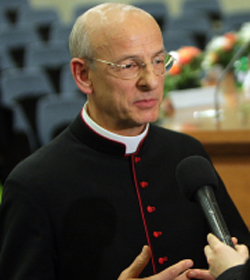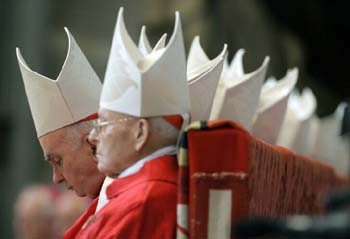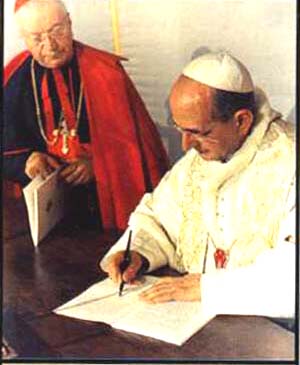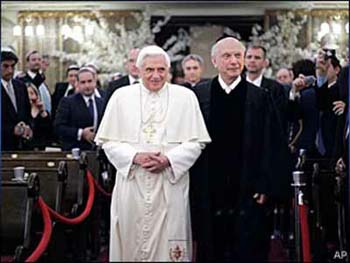 |
Traditionalist Issues
Refuting an article by the Vicar General of Opus Dei
Msgr. Ocáriz’ Serious Theological Blunder
Arnaldo Xavier da Silveira
1. In the December 2, 2011 issue of L’ Osservatore Romano, Msgr. Fernando Ocáriz Braña, Vicar General of Opus Dei and one of the experts of the Holy See in the ongoing theological discussions with the Society of Saint Pius X, published a substantial article titled “On Adhesion to Vatican Council II.” The article fully expresses the opinion, now dominant in some circles, of those who embrace Vatican II, even in those passages contested as being opposed to Tradition, on the grounds of an alleged infallibility of the Ordinary Magisterium or an obligation of “internal assent” governed by the virtue of obedience.
Internal assent according to Msgr. Ocáriz
2. The illustrious Prelate writes: “The Second Vatican Council did not define any dogma, in the sense that it proposed no doctrine with a definitive act. However, even if the Magisterium proposes a teaching without directly invoking the charism of infallibility, it does not follow that such a teaching is therefore to be considered ‘fallible’ - in the sense that what is proposed is somehow a ‘provisional doctrine’ or just an ‘authoritative opinion.’

Msgr. Ocariz defends that Vatican II
requires the assent of the faithful |
"Every authentic expression of the Magisterium must be received for what it truly is: a teaching given by Pastors who, in the apostolic succession, speak with the ‘charism of truth’... ‘invested with the authority of Christ’ ... and by ‘the light of the Holy Spirit.’ This charism, this authority and this light were certainly present at the Second Vatican Council. To deny this, the whole episcopate gathered to teach the universal Church cum Petro and sub Petro, would be to deny something of the very essence of the Church. ...”
3. A little later, Msgr. Ocáriz adds: “The affirmations of the Second Vatican Council that recall truths of the faith naturally require the assent of theological faith, not because they were taught by this Council but because they have already been taught infallibly as such by the Church, either by a solemn judgment or by the ordinary and universal Magisterium. ... The Council’s other doctrinal teachings require of the faithful a degree of assent called ‘religious assent of the will and intellect.’ Precisely because it is ‘religious’ assent, such assent is not based purely on rational motives. This kind of adherence does not take the form of an act of faith. Rather, it is an act of obedience that is not merely disciplinary, but is well-rooted in our confidence in the divine assistance given to the Magisterium and, therefore, falls within ‘the logic of faith and under the impulse of obedience to the faith’ ... Christ’s words, ‘He who hears you hears me,’ ... are addressed also to the successors of the Apostles.”
4. Near the end, Msgr. Ocáriz states: “Nevertheless, there is still room for legitimate theological liberty to explain, in one way or another, how certain formulations present in the Conciliar texts do not contradict Tradition and, therefore, to explain the correct meaning of some expressions contained in those passages.”
God’s ways are not our own
5. Obviously, Jesus Christ could have given St. Peter and his successors the charisma of absolute infallibility. In thesis, this infallibility could cover any and every doctrinal pronouncement by the Popes and councils, in addition to canonical and liturgical decisions, etc. It could even have encompassed pastoral and administrative decisions. The problem is not whether, in principle, the assistance of the Holy Ghost with such an absolute and general character would be possible. Of course it would be.

Jesus Christ endowed neither the Pope nor the Cardinals and Bishops with an absolute infallibility |
In fact, however, Our Lord did not want to endow Saint Peter, the College of Bishops with the Pope, and finally the Church, with such an absolute assistance. God’s ways are not always our own. The Bark of Peter is subject to storms. In short, traditional theology affirms that, as part of Revelation, divine assistance from the Holy Ghost was not promised and therefore not assured, in such an unrestricted fashion in all cases and circumstances.
6. This assistance guaranteed by Our Lord does cover without restrictions the extraordinary definitions, both papal and Conciliar. But the great theological works, especially from the silver age of the Scholastics, show that errors and even heresies can exist in papal and conciliar pronouncements not guaranteed by infallibility.
The doctrine is more nuanced than Msgr. Ocáriz would have it
7. The article of Msgr. Ocáriz sustains as absolute and unconditional the principle that even non-infallible teachings of the papal or conciliar Magisterium necessarily require the assent of the faithful. Now then, great neo-scholastic authors establish important reservations about this thesis, showing that it cannot be taken simplistically as a rule that admits no exceptions.
8. Indeed:
- Diekamp states that the obligation to adhere to non-infallible papal teachings “can begin to cease” in the extremely rare case in which an expert, after a very diligent analysis, “arrives at the persuasion that error entered that decision” (Th. Dog. Man., I, 72).
- Pesch admits the said assent “as long as it does not become positively clear that there was error in a decree by the Roman Curia or the Pope” (Pr. Dogm., I, 314/315).
- Merkelbach teaches that a doctrine proposed in a non-infallible way can allow the suspension of internal assent, accidentally and in extremely rare cases (S. Th. Mor., I, 601).
- Hurter affirms that, regarding non-infallible decisions, it can be licit to “fear error, give conditional assent, or even suspend one’s assent” (Th. Dogm., I. 492).
- Cartechini sustains that internal assent to non-infallible decisions can be denied if the faithful “has evidence that the thing ordered is illicit, in which case he can suspend assent ... without rashness or sin” (Dall’Op. al Dom., 153-154).
- Dom Paul Nau explains that assent can be suspended or denied if there is “a clear-cut opposition between the text of an encyclical and other testimonies of tradition” (Une source doct., 84).
Unduly ‘absolutizing’ the notion of divine assistance

Paul VI signing Populorum progressio, a document not guaranteed by infallibility |
9. Here lies the serious mistake, fraught with grave and even the gravest consequences, into which the eminent and venerable Vicar General of Opus Dei falls. He understands that the Magisterium, assisted by the Holy Ghost, is completely and necessarily immune from any doctrinal deviation. Now then, just as the Ordinary Magisterium of all time, although assisted by the Holy Ghost, was not always covered by infallibility, so also today’s Magisterium receives a divine assistance that does not guarantee absolute exemption from error. Thus, some teachings of the Ordinary Magisterium can diverge from Tradition, and even seriously.
This is the logical consequence of the Apostolic Letter Tuas Libenter, in which Pius IX expounds the various conditions required for the Ordinary Magisterium to enjoy infallibility, conditions that the First Vatican Council expressly did not exclude when it summarized this doctrine in the expression, “Universal Ordinary Magisterium” (this matter would require a more ample study, which I intend to make soon).
10. The new doctrines of Vatican II, such as those on religious liberty, collegiality, ecumenism etc., indicated as diverging from Tradition, can constitute a different teaching (“si quis aliter docet” (1 Tim. 6:3), without implying that the assistance of the Holy Ghost failed and without detriment to the indefectibility of the Church.
“All days, even to the consummation of the world”
11. Therefore, one cannot affirm without further ado the absolute infallibility of papal and conciliar pronouncements. Be it in the name of Magisterial infallibility, obedience owed to Peter by the faithful, a supposed assurance in accepting all that the authentic, non-infallible Magisterium declares, or any other theological or para-theological doctrine that might be envisaged, the truth is that nothing in Revelation assures that non-infallible teachings are infallible in one form or another. It is here, I repeat, that the theses of eminent Msgr. Ocáriz stray from the right path.
12. Let us examine this question under a magnifying glass. Undoubtedly, there are documents of the Apostolic See and traditional theology that affirm, without major distinctions, that all doctrinal teachings of the Popes and councils must be accepted by the faithful, even when non-infallible and, therefore, not adorned with the charisma of infallibility.
Here enter the subtleties of hermeneutics in general and of sacred exegesis in particular: Just as one cannot monolithically understand the Decalogue’s “Thou shalt not kill” since it has exceptions such as legitimate self-defense, likewise one must not take as absolute the principle that those teachings not vested with the charisma of infallibility must be accepted always and in every case. Lending money with interest was proscribed, then allowed, and went through a thousand vicissitudes. Chinese rites went through similar vacillation .
The other side of the coin: a heretical Pope and a schismatic Pope
13. This coin has two faces. If on the one hand traditional doctrine admits the possibility of error in non-infallible teachings of the Supreme Magisterium, as it indisputably does, on the other hand and in parallel, it also admits, without any sede-vacantist connotation, the hypotheses of a heretical Pope and of a schismatic Pope.

Benedict XVI at the New York synagogue, an initiative opposed to the whole past of the Church |
14. Regarding a heretical Pope: St. Robert Bellarmine, St. Francis de Sales, Suarez, Domingos Soto, Bouix, Coronata and many of the greatest masters of Scholasticism admit in thesis that a Pope can fall into heresy. Pietro Ballerini, whose work was important in elaborating the definitions of infallibility at Vatican I, saw the hypothesis of a heretical Pope as “an imminent danger to the faith, and the most serious of all,” in face of which any faithful could “resist him to his face, refute him and, if necessary, question and urge him to repent,” “so that all could guard against him” (De Pot. Eccl., 104/105).
15. Regarding a schismatic Pope, it is indisputable that the silver age of Scholasticism and Neo-scholasticism made it clear that in principle, in periods of profound religious crisis, it is possible for a Pope to separate himself from the Church and fall into schism without immediately losing his office.
This is what happens if the Sovereign Pontiff “subverts all ecclesiastical ceremonies,” “disobeys the law of Christ,” “orders what is contrary to natural or divine law,” “fails to observe what was universally ordered by the universal councils or by the authority of the Apostolic See, above all regarding divine worship,” “fails to observe the universal rite of ecclesiastic worship,” “pertinaciously fails to respect what was established for the common order of the Church,” thus making it possible and eventually obligatory by conscience “to resist him to his face.” Cardinal Cayetano even says (also without any sedevacantist connotation) that in such a case “neither the Church would be in him, nor he in the Church” (II - II, q. 39, a. 1, n. VI).
16. I respectfully submit these reasons to the Most Reverend Vicar General of Opus Dei and, to the full extent prescribed by the Church, also to the See of Peter, column and foundation of the Truth and object of my love and devotion ever since, in my youth as a member of the Marian Congregation, I learned to venerate the sacrosanct doctrine of the Holy Roman Catholic and Apostolic Church. I also submit them to the traditional theologians of our day. Based on the brilliant arguments given by many of them and by those I have presented above, I consider that nothing in Dogmatic and Moral Theology obliges one to assent to the new doctrines of Vatican Council II, which, as Msgr. Ocáriz put it, “were and still are the object of controversy with regard to their continuity with earlier magisterial teaching or their compatibility with Tradition.”

Posted January 9, 2012
Arnaldo Xavier da Silveira first published this article
on his webpage Bonum Certamen on December 28, 2011

Related Topics of Interest
 How a Catholic Should Act Before Bad Popes How a Catholic Should Act Before Bad Popes
 Declararion of Resistance to the Vatican Ostpolitik Declararion of Resistance to the Vatican Ostpolitik
 Resisting the Novelties of the Conciliar Church Resisting the Novelties of the Conciliar Church
 Quo Primum and Novus Ordo Quo Primum and Novus Ordo
 The Novus Ordo Mass Broke the Identity of the Church The Novus Ordo Mass Broke the Identity of the Church
 Looking at Some Basics of Sede-Vacantism Looking at Some Basics of Sede-Vacantism
 Heading to a Hybrid Mass Heading to a Hybrid Mass
 The Motu Proprio After the Emotions The Motu Proprio After the Emotions
 How and When Pope St. Leo II Condemned Pope Honorius How and When Pope St. Leo II Condemned Pope Honorius
 When Does a Heretical Pope Become an Invalid Pope? When Does a Heretical Pope Become an Invalid Pope?

Related Works of Interest
|
|
Traditionalism | Hot Topics | Home | Books | CDs | Search | Contact Us | Donate

© 2002- Tradition in Action, Inc. All Rights
Reserved
|
 |